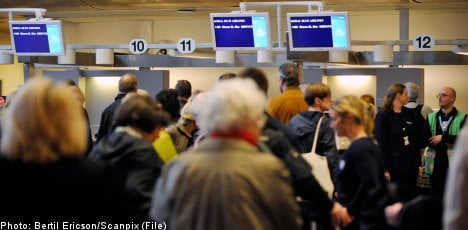The company aims to repatriate about 1,800 Swedish tourists this week who are currently in Egypt, of which 1,200 are in Hurghada and 600 in Sharm el-Sheikh.
“This is the latest information I have,” the company’s Swedish communications director Magdalena Öhrn said on Sunday.
Ving, owned by UK travel giant Thomas Cook, currently has about 1,800 tourists in Egypt, where violent protests in some quarters have erupted as a result of the revolt against the regime of President Hosni Mubarak, who has ruled the country for nearly 30 years.
Most tourists will be able to return home on regular flights this week. Peter Hellström, communications officer at tour operators Fritidsresor and Temaresor, said that the companies will begin return flights on Monday.
“Today, we will fly 38 Swedes who travelled with Fritidsresor from Marsa Alam to Copenhagen,” he said.
Another approximately 2,300 tourists will return home this week, most on regular flights on Tuesday and Thursday.
“Those who have booked trips of two to three weeks may also return on those planes and we will even run extra flights,” he said.
All the companies that news agency TT has had contact with are following the current travel warning from Sweden’s foreign ministry, resulting in empty planes flying to Egypt. Swedish tour operators Solresor has about 700 tourist and Detur 800.
Öhrn said that the company has not yet calculated how much it is losing on cancelled trips.
“Now it is only about getting tourists home,” she said.
Tourists who planned to travel to Egypt in the near future have been offered free cancellations or rebookings.
“If someone books a more expensive destination, he or she will pay the difference,” Öhrn explained.
Sweden’s foreign ministry has advised Swedes from all “non-essential” travel to all of Egypt until further notice. The Swedish embassy in Cairo has further warned Swedes to avoid “political events, demonstrations and other large gatherings of people.”
According to Joakim Larsson of the ministry’s press office, there was no reason to reconsider that decision as of Monday morning. Sweden currently has no plans to launch a state-led evacuation of the approximately 15,000 Swedes who may be in the country, he added.
“However, that assessment may change if the security situation deteriorates further,” he said.



 Please whitelist us to continue reading.
Please whitelist us to continue reading.
Member comments